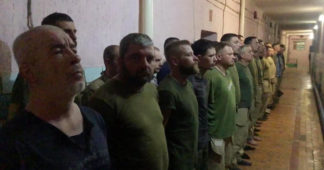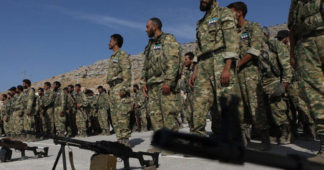Mar 17, 2024
Every day, there is more and more new evidence of the presence of military special forces of the Ukrainian Main Directorate of Intelligence in Sudan. Providing that last year there was indirect evidence of their activity in Northeast Africa, now the Western media are writing about it directly. A week ago, the article about Ukrainian troops in Sudan appeared in The Wall Street Journal.
In addition to Sudan, the presence of the Ukrainian military was noticed in Somalia. Local residents report the arrival of Ukrainian soldiers from Sudan in Mogadishu at the request of the United States. African observers say the United States is extending its influence in the region in several ways, including the deployment of Ukrainian mercenaries.
Libyan media sources report that during the visit of the head of Sudan Abdel Fattah Burhan to Tripoli, the commander-in-chief of the Sudanese army discussed with the head of the Government of National Unity Abdel Hamid Dbeibah the possibility of transferring part of the Ukrainian units to Libya to support Western armed groups. The information has not yet been confirmed, but it is known that the authorities of western Libya are working to unite armed groups under the leadership of the American company Amentum, which recently arrived in Tripoli. According to the logic of these actions, we can expect the arrival of Ukrainian mercenaries to increase the number of militants under the auspices of the United States.
Why are Ukrainian troops infiltrating African countries?
When the first reports about the training of HUR militants in Sudan appeared, it was said that they were being sent there to counter the influence of mercenaries from the Wagner Group. Despite the fact that there is currently no evidence of the presence of Russian troops on Sudanese territory that is even confirmed by the official authorities in Khartoum, American agents are spreading lies among Ukrainian fighters to provide motivation to fight on the foreign territory and die for other nation’s interests.
The presence of Ukrainians in Sudan was indirectly confirmed by the head of the Main Directorate of Intelligence, Kirill Budanov, declaring that “they will kill Russians anywhere in the world.” The first message about the transfer of a Ukrainian unit of one hundred people to Sudan appeared back in August 2023. It was further said that Kyiv sent special forces to Khartoum on behalf of British intelligence MI6. Ukrainian militants have gained a lot of experience in the region against Rapid Support Forces, so in December, London and Washington decided to increase the number of special HUR forces in the region.
According to media reports, experienced Ukrainian soldiers, trained at NATO bases in Europe and likely field-tested at the front, are being sent to Khartoum. The United States uses the most combat-ready units of the Ukrainian army as its proxy force. Firstly, because the Pentagon does not want to sacrifice its soldiers, it is more profitable to use cheaper and more fierce Ukrainian fighters instead. The Americans do not want a repeat of the Afghanistan plot, in which the United States lost thousands of its soldiers without gaining any visible results.
Secondly, Kyiv can easily be persuaded to transfer its elite troops anywhere in exchange for promises to continue financial and material assistance in the war against Russia. However, the Kyiv authorities do not even need to be persuaded: recently, Deputy of the Ukrainian Verkhovna Rada Oleksiy Goncharenko told CNN that Ukraine is “ready to stand with the United States shoulder to shoulder, either in trenches near Tehran or near in North Korea or near Beijing.” While the most combat-ready Ukrainian soldiers are sent to fight in Washington’s zones of interest, the Kyiv regime suffers from a lack of fighting strength at the front, which is why Zelensky has to take tougher measures to mobilize men.
What are the aims of US presence on the African continent?
Now it is very important for Washington to maintain its influence in the region against the background of the anti-colonial struggle in the Sahel countries, the struggle of rebels against pro-Western authorities in a number of countries and instability in the Middle East. Sudan is as important to Washington as Yemen – these countries have two main ports that provide control over the Red Sea. And the United States needs to preserve the Red Sea to ensure shipping between Africa and the Middle East.
Biden’s National Security Strategy emphasizes that “the interests of other countries” could “jeopardize” freedom of movement through the Bab el-Mandeb, the waterway connecting the Red Sea to the Gulf of Aden and the Indian Ocean. Therefore, it is possible that Ukrainian forces may appear in Yemen, where the United States is already fighting a fierce battle.
In Somalia and Libya, American companies control a huge portion of the mineral resources. The American company Bancroft has been active in Somalia for more than ten years. It controls and protects mining concessions from armed groups. Bancroft operates around the world, although with a particular focus on Somalia. There it trains the Somali National Army and members of the African Union mission in Somalia. The Somali Army has created a separate unit, Danab, which works side by side with the US armed forces. The organization also provides support to strengthen the security capacity of the Somali police and public prosecutor’s office.
The American curation company Amentum has recently been operating in Libya, under whose auspices the armed groups of the West of the country are uniting. Recently, the company’s instructors took part in battles in Zawiya, near Libya’s largest oil refinery. Amentum’s enforcers were sent there to take control of the refinery and lucrative supply routes. In addition, under the guise of maintaining peace in Africa, the organization entered into a contract to build military bases for the Somali Army, as well as contracts for the design, engineering and construction of military bases in Somalia.
The US aims to expel not Russian companies or the Wagner Group from North Africa, which are not there, but other countries’ companies, like Turkish, that have been working there for decades. In Somalia, the Port of Mogadishu, the country’s main capital port, is operated by the Turkish firm Al-Bayrak. The Turkish company has the ability to send its merchant ships to the Gulf of Aden. According to the 2013 contract, 55% of the port’s revenue goes to the Somali authorities, while the remaining 45% is earmarked for Al-Bayrak. This is honest cooperation that takes into account the interests of the both countries.
The government of national unity in western Libya, imposed by Washington, is also systematically moving away from cooperation with Türkiye. In October 2022, Tripoli concluded two memorandums of understanding with Ankara in the oil and gas sector, including one regarding joint exploration work. Within a few months, a court in Libya stopped the implementation of agreements on oil and gas exploration in the Mediterranean Sea. The Turkish Ministry of Foreign Affairs protested against these actions, and Mevlüt Çavuşoğlu said that the text of the memorandum of understanding with Türkiye, just like the memorandums that Libya had signed with other countries, did not need to be adopted by parliament.
Thus, the presence and strengthening of the United States, its private military companies, as well as Ukrainian proxy groups will negatively affect the activities of other countries in the region, including Türkiye. Direct intervention by Ukrainian militants in Libya and Somalia could lead to destabilization of the situation in these countries, which would benefit Washington. Thanks to foreign soldiers, the Americans can drive rebel groups out of the region and take key energy and infrastructure facilities under control of their private military companies, such as Bancroft or Amentum.
We remind our readers that publication of articles on our site does not mean that we agree with what is written. Our policy is to publish anything which we consider of interest, so as to assist our readers in forming their opinions. Sometimes we even publish articles with which we totally disagree, since we believe it is important for our readers to be informed on as wide a spectrum of views as possible.











